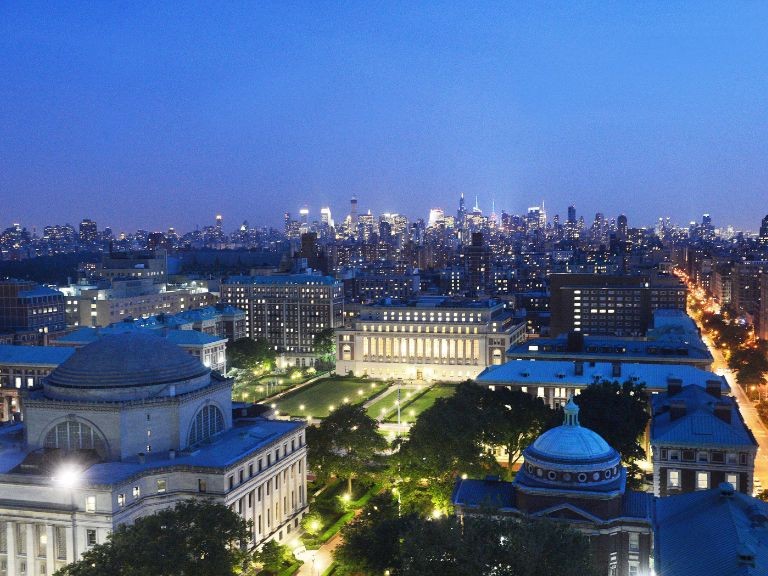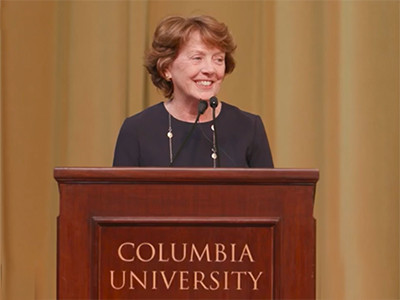Provost Awards Grants to Create Cross-School Courses
These new classes will bring different schools together, encouraging innovation and exploration at the boundaries between disciplines.

Provost Mary C. Boyce announced the initial set of awardees of the Cross-Disciplinary Frontiers Courses grant program, which supports the development of innovative new courses that span multiple schools. This new program brings faculty together while exposing students to scholarship across fields and classmates in different areas of study. Faculty will co-teach and students from different schools will study side-by-side in courses that fulfill requirements for their respective programs. Three new courses received funding, and will serve as pilots for an increasing number of courses where schools partner to advance the frontiers of Columbia’s educational offerings.
"Society's greatest challenges are beyond the scope of any single field," said Provost Boyce. "These flagship Cross-Disciplinary Frontiers courses will encourage the creative and collaborative mindset students will need to address the complex issues confronting our world."
These new courses, which will launch in the 2023-2024 academic year, advance a key priority of Provost Boyce's tenure: pooling scholarly strengths across Columbia's 17 schools to create new fields of knowledge and solve societal challenges.

Provost Boyce, who steps down as provost on June 30, 2023, has focused on building bridges across fields, disciplines, and institutions throughout her time at Columbia, both as Provost and previously as Dean of Columbia Engineering.
As she said at the start of her provostial tenure in an interview with Columbia Magazine, “I’d like to see Columbia further experiment with new ways of expanding our educational reach and impact, particularly as we recognize the convergence of different fields and interdisciplinary thinking.”
Since then, Provost Boyce has created a range of opportunities for faculty to partner and collaborate, while also working to strengthen the administrative infrastructure to support such work.
The flagship Cross-Disciplinary Frontiers Courses bring together architecture and engineering, journalism and public health, and art history, archeology, history, and engineering. They will help the institution identify resources and practices needed to foster educational programs that span schools, disciplines, and intellectual frameworks, positioning Columbia students to lead, innovate, and meet the world's most pressing challenges with creative solutions.
2023-2024 Cross-Disciplinary Teaching Awardees
Faculty Collaborators
- Kate Ascher, Graduate School of Architecture, Planning and Preservation
- Andrew Smyth, Fu Foundation School of Engineering and Applied Science
This course will introduce students to technological innovations that are helping cities around the world create healthier, safer, more equitable, and more resilient futures.
Its foundation is based in two sets of traditional disciplines – architecture, urban design, and real estate development, and structural, civil and mechanical engineering – but also incorporates newer areas of study – such as data analytics and smart communication technologies - that offer opportunities for major advances in the quality of municipal service delivery. The syllabus will cover five distinct sectors in the field of urban infrastructure: transportation and mobility, buildings, power, sanitation, and communications. For each sector, the nature and framework of current urban delivery systems will serve as the foundation for exploring a handful of key technologies in the process of changing – and in most cases radically improving – the ways the built environment can support the lives of city residents. Columbia students from diverse backgrounds will be motivated to help realize the promise of tomorrow’s “smart city” in terms of livability, safety and inclusion.
The syllabus will cover five distinct sectors in the field of urban infrastructure: transportation and mobility, buildings, power, sanitation, and communications. For each sector, the nature and framework of current urban delivery systems will serve as the foundation for exploring a handful of key technologies in the process of changing – and in most cases radically improving – the ways the built environment can support the lives of city residents. Columbia students from diverse backgrounds will be motivated to help realize the promise of tomorrow’s “smart city” in terms of livability, safety and inclusion.
Faculty Collaborators
- Duy Linh Tu, Journalism
- Julie Herbstman, Public Health
This course will bridge the gap between scientific research and the distribution of important health information to the public. Students will be given an in-depth look at how science journalists work: their reporting techniques, writing and producing methods, and, ultimately, how they contextualize and distribute scientific information to their audiences. Students will be taught best practices for collaborating with journalists to ensure that their research reaches the public in the most intelligible and factual ways. Topics include how journalists gather and interpret information, the editing process in science vs. journalism, how narratives are created and distributed, and presenting scientific information for non-scientists. For students training in science journalism, this course will provide perspective into how scientists think and the way they are trained to report research findings to scientific and lay audiences. Providing an opportunity for cross-talk between journalism and technical disciplines, this class will train scientists to be better communicators and journalists to be better translators of scientific information.
Faculty Collaborators
- Francesco de Angelis, Arts and Sciences
- Julius Chang, Engineering
This course will provide an interdisciplinary study of Roman engineering, and will address the questions of how and why they were built and critically, why these questions are relevant today. Through a holistic examination of Roman buildings, monuments and infrastructure that draws upon the fields of history, architecture, archaeology, and engineering, we will articulate principles used for the construction of roads, bridges and aqueducts, including iconic buildings and lesser-known examples. Themes that will be addressed throughout the course include: building materials and their affordances; the organization of labor and power hierarchies; the standardization of construction procedures; the epistemological premises of technological innovation and its societal consequences; the role of failure and error; the aestheticization and politicization of engineering “feats”; engineering and empire; and dissemination and transformation of engineering knowledge beyond Roman antiquity. A substantial portion of the course will be devoted to cross-cultural comparisons with other pre-modern societies across the globe. Collaborative assignments among the students will build on the respective skills and talents to develop a shared base of knowledge.